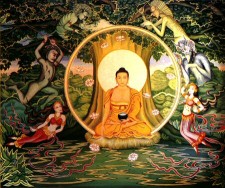 Two famous pilgrimages:
Two famous pilgrimages:
The Journey to the West – the legendary voyage of the Buddhist monk, Xuanzang, to India to bring the Sutras back to China and establish Buddhism there.
Another, less celebrated Journey from the East – Freud’s parents, Ostjuden (Eastern Jews), emigrating in a horse cart from the ghettoes of East Galicia to Vienna.
The Silk Road channeled a rich current of human activity across Asia from China to Europe. Along with the merchants and their caravans of camels laden with spices and luxuries, ideas flowed back and forth across the continent. In the center, there was India.
It was in India that the powerful concepts of Buddhism originated, then spread East, to China, and West – ultimately, perhaps, to Freud’s office in Vienna, where so many of his ideas about living more consciously seem to echo Buddhist philosophy.
I’ll touch on two issues: first, why Buddhism doesn’t have to be intimidating, and second, some interesting stuff it has to say about our daily lives:

You don’t have to think of Buddhism as just a religion. The ancient India of around 500 B.C.E.,where the Buddha, Siddhartha Gautama, lived, was a lot like the historically contemporary Ancient Greece – the existence of a pantheon of gods and goddesses was taken for granted. Buddha wasn’t interested in being a god – there were already plenty of gods. His goal was achieving human enlightenment – a condition of peace and serenity. Over thousands of years, Buddhism spread all over Asia and splintered into a thousand different schools and practices. Some of them espouse devotional practices, complete with temples and incense and kowtowing before fat, smiling statues. You can disregard much of that, and concentrate on the ideas.
To give you a taste of what I’m talking about, here’s the most famous single story in Buddhism. There are a dozen variations, but this covers the basics. See if it doesn’t leave you thinking:
The Buddha was born a wealthy prince. Upon his birth, a fortune-teller issued a prediction that the young prince would eventually renounce all his wealth, and become a monk. To prevent this, his father, the king, ordered that Siddartha be prevented from leaving the walls of the palace. For 29 years, the prince was permitted to see only wealth and beauty.
Finally, perhaps on an impulse – some say a mischievous god was involved – Prince Siddhartha escaped for the first time outside the palace walls. Almost at once, he saw four famous sights, which changed his life forever:
He encountered an old man, and learned that he would not remain forever young.
He saw a leper, and learned of the existence of suffering and disease. 
He saw a corpse, and knew that one day he, too, would die.
He met a monk, and realized there were other paths to joy than the pleasure garden within the palace walls.
From that day forward, the Buddha became a monk, devoting himself solely to the search for enlightenment.
I told you this was a powerful story.
Opening your eyes to the world around you, and the emotions you carry within, stirs something in the human soul, which could change your life forever.
That’s what we do in psychotherapy.















